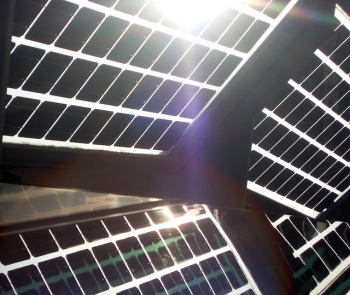JulianConstruction.com: Increasing Energy Efficiency with Solar Panels

Solar panels make homes more energy efficient. The electricity that is generated by the panels is not only good for the environment, it can reduce your energy costs. The amount of money you can save by installing solar electrical systems is determined by how much electricity is used in your home.
Another benefit of installing solar panels is net metering, a term used to describe the policy of contributing any unused electricity back to the utility grid. Net metering was implemented to promote private investment in renewable energy. In California, it is a special billing arrangement that provides credits to customers with solar PV systems. How does net metering work? Solar panel systems generate most of their electricity during the middle of the day when the sun is shining. If your home produces more electricity than what is required, it goes back to the main utility grid. Homeowners receive credits at full retail rates for this excess electricity.
In addition to energy savings, installing a solar electric system helps reduce CO2, NOX and SO2 emissions. In a poll conducted by USA Today, 91% of survey respondents preferred solar power compared to other sources of power.
Solar panels do not make any noise and require very little maintenance. They can be installed when a home is being re-roofed and will add significant value to the property. The state and federal government also offers homeowners special tax benefits and rebates for using clean energy solutions. For example, California residents (and business owners) will receive cash back incentives under the state’s “Go Solar” program.
Do you want to know more about your current energy usage? The EPA has several tools that can help homeowners evaluate their energy usage and find out the best way to become more energy efficient. These EPA tools include the Home Energy Yardstick:
https://www.energystar.gov/index.cfm?fuseaction=home_energy_yardstick.showgetstarted
and Home Energy Advisor:
http://www.energystar.gov/index.cfm?fuseaction=home_energy_advisor.showGetInput&__utma=172919287.1213405742.1380054400.1380054400.1380054400.1&__utmb=172919287.8.9.1380055517445&__utmc=172919287&__utmx=-&__utmz=172919287.1380054400.1.1.utmcsr=google|utmccn
The Home Energy Yardstick is an assessment of how much energy your home used during the past 12 months compared to similar types of homes. The data that is used to conduct the assessment comes from your utility bill. The tool uses an algorithm based on the size of your home, number of occupants and the weather in your area. Scoring is on a 1 to 10 scale. A home that scores “10” is performing well compared to other similar homes, while a home that scores “1” is performing poorly when compared to similar types of residences. To use the tool, you will need to provide your zip code, the square footage of your house, the number of occupants and utility bill data for the past 12 months.
The Home Energy Advisor is an online service that gives you free advice on improvements that can increase the energy efficiency of your home. To receive your recommendations, you will need to provide your zip code, data on how your home is cooled and heated, and information on the type of water heater that you use.
If you want to decrease energy costs and are considering installing solar panels, general contractors with experience in solar panel installations should be contacted to discuss your specific needs and options.
